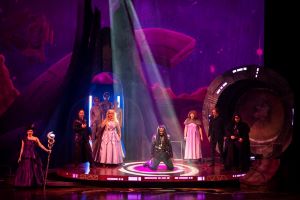“Beauty of tone and legato phrasing, with faultless technique…” are the principal ingredients of bel canto singing. So declares a venerable old music dictionary. And so perhaps the Bel Canto Company singers and their conductor Welborn Young were inspired by those words as they prepared for this Celebration Concert. Said concert marked the thirty-ninth edition of an invaluable workshop for choral music specialists, sponsored by Hinshaw Music, Inc. of nearby Chapel Hill and hosted in the grand sanctuary of Edenton Street United Methodist Church. Present at the concert and workshop were featured composers David Schwoebel and Dan Forrest.
Given his manifold other activities, it hardly does justice to the Illinois-born David Schwoebel to refer to him as just a prominent composer. This renowned musician conducted all works, mostly his own compositions, during the first half of the program. “Go Forth for God” served as an excellent and rousing opener to warm up singers and audience, the latter joining in on the last section. Adam Ward, veteran accompanist for these gatherings, should be highly lauded for his support here on the organ, and indeed for his work on that instrument and the piano throughout the evening. “My Faith Has Found a Resting Place” and “Praise, My Soul, the King of Heaven” were variations on the well-known originals.
Schwoebel and the Bel Canto women reached a fine zenith on “How Do I Love Thee,” with text from the famous poem of Elizabeth Barrett Browning. Such was the satisfying harmony and blend that the piece should be required study for every ensemble of treble voices. The composer chose his “You Shall Go Out with Joy” to end the first half in decidedly upbeat fashion. “…the mountains and the hills / shall break forth before you in singing!”
For the two pieces by “other” composers, Schwoebel chose Timothy Bushong’s “Wherever You May Go” and “All Bells in Paradise” by John Rutter. The former was essentially a secular “blessing,” a gorgeous rendering of a text perhaps so bland as not to offend even the most squeamish. The latter was one of the more exquisite Christmas songs in the literature. The well-integrated organ accompaniment and the extraordinary melding of the voices made for the highest choral artistry.
Bel Canto’s own conductor Welborn Young assumed leadership after intermission to feature music by the second honored composer. What composer of choral music has come on more prominently and to wider acclaim in recent years than Dan Forrest? This young resident of Greenville, South Carolina can take his place among the elect. The first of Forrest’s three numbers was perhaps not among his more remarkable accomplishments, an arrangement of “God of Grace and God of Glory” for choir and congregation. Tinkering with the lofty verses of Harry Emerson Fosdick made for a substantially less felicitous text. “Jesus, Lord, We Look to Thee” captured the composer at his best, building on the powerful Charles Wesley text, from peaceful opening lines up to fortissimo and back. Soprano chorus member and Assistant Conductor Liz Doebler was the able leader here.
Once you get past the initial oxymoronic jolt, Requiem for the Living readily grows on you. This huge forty-minute work takes certain appropriate liberties with the traditional requiem format. Joining the organ to accompany this chamber version premiere was a small orchestra of the first rank, a full complement of strings and percussion, with harp, horn, flute and oboe, all forces led by Young. The spirit of the work was established early with the somber and elegantly orchestrated instrumental “prologue” leading into the initial Introit – Kyrie.
Instead of the Dies Irae, Forrest has resorted to the book of Ecclesiastes (all is vanity) for “Vanitas Vanitatum,” which he calls “a biting essay on the vanity and pain of existence.” This stormy movement, with percussion and organ so potent, was reminiscent of certain measures from the “Organ Symphony” of Saint-Saëns.
The Agnus Dei introduced boy soprano Donovan Elliott, a voice of uncommon clarity and appeal. He appeared again with yet more power in the Lux Aeterna. Chorus member Lindsey McConville Gallagher brought forth an authoritative and radiant soprano later in the Agnus Dei. Chorus tenor Jeremy Whitener sounded a clarion call with “Come unto me all ye who labor…” in the Lux Aeterna.
Prediction: Requiem for the Living will assume a place among the staples of grand choral literature. In these pages a couple of years ago at the thirty-seventh edition of this workshop, the reviewer reasoned that “Hinshaw Music could scarcely have found a finer group than Bel Canto to demonstrate the company’s choral wares.” And now here for number thirty-nine, how could this same Hinshaw have improved upon composers Dan Forrest and David Schwoebel?











